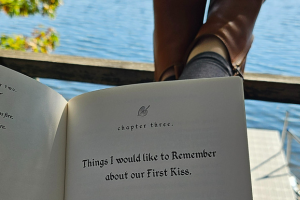“A hero is an ordinary individual who finds the strength to persevere and endure in spite of overwhelming obstacles.”
-Christopher Reeve-
The Hero’s Journey. This is the archetypal story that Joseph Campbell, author, professor of comparative literature and mythology, discovered as a common theme across many cultures and many eras. The journey of the young man to find himself through struggle and through challenges has been the fodder of stories, statues, even comic books, and remains a source of inspiration for male adolescents even today. It was Joseph Campbell that George Lucas turned to when creating the trilogy Star Wars.
The Hero’s Journey is a story that is told in many different ways and we never tire of hearing it. We watch, on the edge of our seats, in Avatar, in The Lion King, hoping that the boy will “man up” to what is facing him and discover what is on the other side of challenge. (this also happens with young adult but primarily this story is told through the boy’s perspective and indeed, is his journey). Other cultures re-tell this story in word, in song and even in ritual.-Vision Quests of the indigenous cultures of the Prairies in Canada as well as other cultures.
Do heroes exist in today’s world? Yes. There is a potential for every boy to grow into a hero. Why don’t we have more evolving heroes right now and what can we do about it. In a few words: we can stop helicopter parenting our young males. These days, it is common and almost a competitive one-upmanship with other parents, to solve our teenage and young adult male son’s problems. Current trends in parenting prevent the young men of North America from facing any challenges because Mommy and Daddy are always around to bail out their sons. Whether its helping our children get into school or get a job-such things as writing essays for our children or even as far as what has happened in Holly wood with bribery for university placement , getting hyper-involved in the progress of our grown children is preventing them from challenging themselves, knowing their own power and finding confidence in themselves.
The Hero’s Journey typically starts with the Hero feeling out of place in the ordinary world which we can compare to the shift that occurs for young men during adolescence. Boys who used to be comfortable hugging mom or spending time with day suddenly become distant, unavailable-spending more time in their rooms. Its here where these young men start to experience a sense that their natural need to separate is not okay with the parents. Parents who are projecting their own loneliness or guilt on their child.
The hero-in-the-making is then called upon to take on a quest or “Usually there is a discovery, some event, or some danger that starts them on the heroic path. Heroes find a mystic object or discover their world is in danger”. (Campbell, The Hero’s Journey) Again we can like this to looming end of secondary school, where as the boy moves toward grade 11 and then 12, they start to realize that the end of their lives as they have spent them for the first 18 years is looming. They start to cluster together, to question older friends and siblings who have made their way through this significant step.
The new world the would-be hero is forced into is much different than the old one. Campbell describes this new world as a “fateful region of both treasure and danger…a distant land, a forest, a kingdom underground, beneath the waves, or above the sky, a secret island, lofty mountaintop, or profound dream state…a place of strangely fluid and polymorphous beings, unimaginable torments, superhuman deeds, and impossible delight”. Oz, Narnia, Outer Space or a college campus. Anyone who has gone to university has experienced the absolute terror and thrill of being left to our own devices, with the freedoms and the responsibilities of life at college- studying, partying, exams, getting yourself out of bed on time etc. Here, well-meaning parents organize meals, call every morning, insist on daily check-ins or more. It now thought that a lot of students of the Gen-Z and younger struggle with school because their parents are overly involved. Young people are more anxious if they have clingy parents, say researchers, according to an article in the Daily Mail by Victoria Allen. Those with over-involved parents had a harder time transitioning to university and to adult life.
Parents needing to stay over involved in their children’s lives may leave children without some of the coping skills they need for adulthood.
Over-involvement by parents is associated with negative outcomes says Dr Carrie Smith in a recent study done at Univ of Mississippi. Parents who will do anything to help their children and prevent them from failing or having a bad day are not helping their adult children.
Then, there is the refusal of the quest. In Campbell’s model, typically there is a refusal to take on the challenge, the hero is scared, feels they don’t have the tools to take on this challenge. Here is where the Journey might end for so many would-be heres in today’s western world. If mom or dad step in, the challenge never even starts.
If mom and dad give everything besides the freedom to learn coping skills, there is a greater chance a would-be man going off to school is racked with anxieties. These included not being able to handle the workload, not having enough money, failing to transition to college, sounding stupid in class and other people thinking badly of them.
Interestingly students who reported having over-involved parents were far more likely to be worried about the transition to college. These worriers were more likely to say they had ‘overprotective’ parents, who tended to ‘baby’ them and tried to control them.
But those students whose parents gave them more independence were more optimistic.
The next step, if the young stallion can make it past the gates of home, is accepting the call. They enter into the unknown and experience super natural beings, circumstances never before encountered and even the threat of death. As teenagers, generations before have all undergone these challenges and indeed, some of us have wondered how we made into our adult life in one piece. Perhaps its because of this that we are so protective? We don’t trust our children because we barely trusted ourselves.
The outside world has new rules that the hero must navigate. The Hero learns the rules quickly and is tested over and over again and so becomes strong. This is because in the end, its not the finish of the journey that is so important, its the journey itself (adolescent years,teenage years, and young adulthood) that is significant. Its the struggles where we learn to build confidence and trust ourselves.
Another aspect of the journey is the meeting of a supernatural being. The Yodas of the world appear here to offer advice on the outside world that they themselves have mastered. If we don’t teach our children to go out in the world, to separate from us as the source of all wisdom, we don’t give them the opportunity to meet the professors, coaches, bosses or co-workers who are the other sources of inspiration for a life that may not be exactly like our own.
Another part of the journey is the entrance stage right of a helper. Again, if we don’t teach coping skills to deal with disagreement among friends or roommates, if we consider that our child is always in the right and expect others to treat them just like we do, as extra special beings, than they lose the ability to have meaningful relationships with other people who may not think that every word that comes out of their mouths are blossoms of interesting and unique expression of creativity. It is thought that helicopter parents have one main goal, to have their child be happy. If a disagreement between friends causes Junior to become unhappy and they take that as a sign to end the relationship, there is no growth.
Finally, there is the final showdown. The hero has progressed through a series of tests, a set of obstacles that make them stronger, they are ready. Finally the hero has the Obstacle that all of the challenges have prepared the young warrior for. This is an artificial climax because in reality, because the movie or the story has to end. In reality, life is filled with Challenges at work, in our families, with our friends, within our communities. The Buddha said, life is suffering and its these challenges that comprise this pain. If we don’t offer our children the trust in them to resolve the challenges, we have left them ill-prepared for life. Its ironic because we may over-protect in order to make their lives easier but in reality we are making life much much harder.
One definition of a helicopter parent is parents who pay extremely close attention to their children to try to protect them from failure, rejection and injury. What but failure, rejection and injury could more define the Hero’s Journey?
In thinking of the Buddhas words, and then his life, we can recall the pivotal moment when he became the hero, the moment he left the confines of the four walls of his parent’s home that they tried so desperately to keep in within to protect him. They were the original helicopter parents in a way.
A friend once said, “bigger kids, bigger problems” as our children grow, we can get more and more anxious about the problems that seem to telescope into bigger and bigger life struggles. If we can relax and be a guide, be a listener and not a fixer, we will be doing two things. We will be able to keep the evolution of our children into adults and the struggles that arise in perspective and not get as stressed ourselves when we see them go through lower moments. We can be that moviegoer at the edge of our seat, wanting the hero to do the right thing but unable to step into the film to do it for them. And we can also offer our children, our young men, our would-be heroes the opportunity to rise and become whole, to become self-actualized. That is the greatest gift we can give them.







Read 0 comments and reply